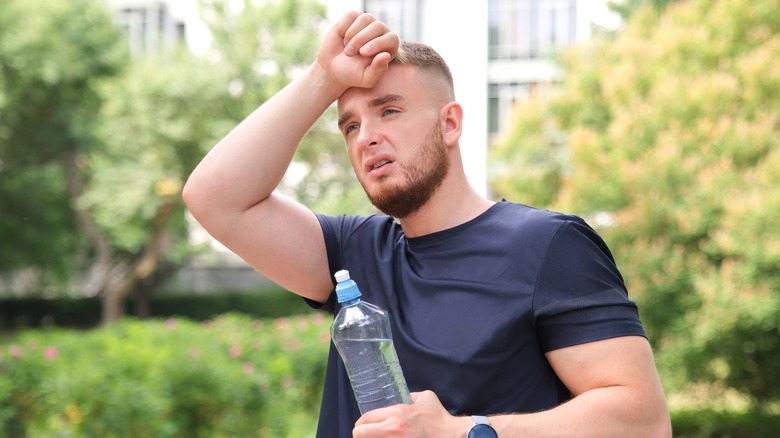Side Effects Of Pre-Workout That Might Surprise You
Athletes and gym-goers spent a whopping 12.6 billion on pre-workout supplements in 2019, reports Grand View Research. Most pre-workout formulas boast a combination of caffeine, creatine, beta-alanine, branched-chain amino acids (BCAAs), and other nutrients. Caffeine, for example, can increase your energy and mental focus. Creatine fuels physical performance, while BCCAs reduce muscle breakdown and aid in recovery. Some products may also contain taurine, citrulline, and other amino acids, points out Grand View Research.
Most people use pre-workout supplements for a quick boost of energy. But the benefits don't stop here. These products can also improve body composition (aka fat-to-muscle ratio), enhance running performance, and delay fatigue, suggests a 2010 study featured in the Journal of the International Society of Sports Nutrition (JISSN). As the researchers note, caffeine alone can reduce fatigue and increase endurance.
These perks come at a price, though. For some folks, the side effects of pre-workout supplements outweigh any potential benefits. Since these products are not regulated by the FDA, you don't really know what's inside the bottle (per Grand View Research). Manufacturers often use proprietary blends, meaning that they don't disclose how much of each ingredient is used. To stay on the safe side, check the label and read customer reviews before buying new products.
Your pre-workout may cause digestive distress
Pre-workout supplements are generally safe in the short run, explains a 2019 study published in Nutrients. However, more research is needed to confirm their long-term safety. But even so, certain ingredients in these products have potential side effects. Magnesium, for example, increases bowel motility by drawing water into the intestines, notes Verywell Health. Therefore, it may cause loose stools or diarrhea when consumed in large amounts.
Caffeine has similar effects. Drinking two or more cups of coffee daily can cause diarrhea (per the International Foundation for Gastrointestinal Disorders). Some pre-workout supplements contain highly concentrated caffeine in liquid or powder form. BSN Endorush, for instance, delivers 200 milligrams of caffeine per serving, whereas a cup of brewed coffee has 96 grams of caffeine (via BSN Supplements and the Mayo Clinic). Therefore, one serving of BSN Endorush has more than double the amount of caffeine in one cup of java and can give you the runs.
Creatine, another popular ingredient in pre-workout supplements, may cause diarrhea too. This side effect is more likely to occur when you ingest over 10 grams of creatine in one sitting, reports a 2008 review featured in Research in Sports Medicine.
You may gain water weight
Speaking of creatine, did you know that it may cause water retention? This amino acid pulls water into the muscle cells, causing them to expand. But you may also notice an increase in body weight due to the extra water, states a 2007 review published in the JISSN. On the positive side, your muscles may appear fuller and recover faster from training.
Anecdotal evidence suggests that creatine can also cause bloating, muscle cramps, dehydration, and organ damage (via the JISSN). However, current research doesn't support these assertions. Creatine has no detrimental effects on healthy people, points out the JISSN. On the contrary, it may enhance athletic performance and reduce injury risk. In clinical trials, it has been shown to increase maximal power and strength by 5 to 15% and sprint performance by 1 to 5%, reports the JISSN. Moreover, it promotes muscle growth and recovery.
If you're concerned about weight gain, you can take a pre-workout supplement without creatine. However, water weight gain is temporary and shouldn't affect your workouts — or your health.
You might experience headaches
Your pre-workout might also give you a headache, says registered dietician Lonnie Lowery, Ph.D. (via Men's Journal). In general, this side effect is due to arginine, an amino acid with vasodilating properties. After ingestion, arginine dilates and relaxes the blood vessels in your head (and other tissues), which in turn may cause headaches. Other vasodilators, such as citrulline, may have similar effects.
L-citrulline, a naturally occurring amino acid, is converted to arginine in your body and therefore expands the blood vessels, explains a 2021 research paper published in Applied Sciences. However, both arginine and citrulline support optimal health and may improve sports performance. When used as part of an exercise program, these compounds may delay fatigue and increase your speed, strength, and muscle oxygen uptake. They also have beneficial effects on metabolism, cardiovascular function, and sexual health (per Applied Sciences).
The JISSN states that most pre-workout supplements are safe and have minimal adverse effects. However, some products may contain hormones, banned substances, or impurities. That's why it's important to choose a trusted brand and research the ingredients used. Pay attention to the amount of caffeine per serving, too. When consumed in excess, this stimulant may cause nausea, headaches, irregular heartbeat, and other side effects, notes the JISSN. You might also want to check the Operation Supplement Safety (OPSS) database, which features a list of potentially harmful supplements and ingredients, along with practical tips to help you make the right choice.
Anxiety and jitters
Imagine this scenario. A character on a sitcom becomes jittery after drinking several mugs of some sort of beverage. What do you think was in those mugs? Chances are you guessed coffee or some sort of caffeinated beverage. But a pre-workout supplement can also make one feel jittery and even anxious.
As Medical News Today explains, a number of pre-workout supplements contain caffeine. Now, on the one hand, caffeine can make one more energized and alert because of how it affects certain receptors in the brain. However, the U.S. Food and Drug Administration (FDA) cautions that overdoing your caffeine intake could result in anxiousness, an accelerated heart rate, and those jitters that might look funny on a sitcom but are unpleasant to experience in real life. Okay, so caffeine's alright in small amounts, right? Not necessarily, since some individuals are more sensitive to caffeine than others, meaning even a little could make them jittery and anxious. So, if you're sensitive to caffeine, then you should really look into pre-workout supplements that don't contain caffeine.
Additionally, a person who has anxiety needs to be a conscientious consumer when it comes to pre-workout supplements (via Medical News Today). This means not only knowing what's in different supplement brands, but also working with a healthcare professional and letting them know what pre-workout supplements you're planning to use.
Insomnia and restlessness
You bump into a friend at the gym as they're taking a pre-workout supplement. The two of you decide to meet up tomorrow for lunch. The next, your friend tells you how they had a terrible time sleeping last night. When you ask if the supplement they took at the gym might be the problem, they wave off the idea since they took it hours before they went to bed. Unfortunately, your friend my be overlooking the source of their insomnia.
As Dr. Lonnie Lowery, associate professor of exercise physiology and nutrition at the University of Mount Union in Ohio, told Men's Journal, the caffeine in many pre-workout supplements sets in motion what are known as the fight-or-flight hormones (epinephrine and norepinephrine). What's more, caffeine can stay in one's body anywhere from three to five hours. Now to be fair, everyone metabolizes caffeine at different rates, and the amount of caffeine can vary from supplement to supplement. But if you metabolize caffeine at a slower rate, it could impact the quality of your sleep even if you took your pre-workout supplement around lunch.
Of course, some people do like to work out in the evening, and as you'd expect, that can impact one's sleep. As Academy of Nutrition and Dietetics spokesperson and strength and conditioning coach Alicia Romano told Gentlemen's Quarterly, "Most individuals will have trouble sleeping if they take a caffeine-heavy pre-workout supplement before an evening workout."
Dehydration
Let's be clear: Dehydration can be a serious health concern. As the Mayo Clinic explains, being dehydrated could result in medical problems like seizures, urinary tract infections, and a potentially life-threatening drop in blood pressure and oxygen known as hypovolemic shock. So, you want to be careful not only during a workout but also with your pre-workout supplements.
Remember, caffeine is a common ingredient in many pre-workout supplements (via AZCentral). However, so is a substance called creatine, which as the Mayo Clinic explains is an amino acid that your muscles use for energy. Now, on the one hand, taking creatine in (for example) a pre-workout supplement could help with increasing one's muscle mass — but remember, one aspect of creatine is that it draws water into your muscles. That process takes the water away from other areas of your body, which can result in dehydration. In addition, both caffeine and creatine can lead to more frequent trips to the bathroom to urinate, which can also cause dehydration.
Although both caffeine and creatine can lead to dehydration, there is some fine print when it comes to these two typical pre-workout supplement ingredients. The Mayo Clinic notes that caffeine can make creatine less effective. It's all the more reason to know what and how much of certain ingredients are in your pre-workout supplements. But even if you don't use pre-workout supplements, proper hydration is always important.
High blood pressure
While pre-workout supplements can cause dehydration and as a result a sudden drop in blood pressure (via Mayo Clinic), they also can be at least part of the reason why someone has high blood pressure, per Medstar Health. And once someone has this medical condition, they could be increasing their chances of developing other potentially life-threatening health problems.
As board-certified cardiologist Dr. Nicholas Paivanas noted on Medstar Health, caffeine is often found in pre-workout supplements since it can boost one's mood and energy. However, Dr. Paivanas cautions that "Consuming high doses of caffeine from pre-workout supplements, on top of your normal daily intake of caffeine in coffee, soda, or other sources, can lead to a number of heart-related side effects, including increased blood pressure (hypertension), which can raise your risk of a heart attack." Dr. Paivanas also explains that he's seen firsthand how pre-workout supplements can be a factor for other health issues like heart palpitations (tachycardia), as well as damage to the arteries called spontaneous coronary artery dissection (SCAD).
But that's not all. According to the Centers for Disease Control and Prevention (CDC), having high blood pressure can increase your chances of having a stroke and developing heart disease. It can also do damage to areas of your body like your eyes, your kidneys, and even your brain. But while there are home blood pressure monitors, you should still have a medical professional check your blood pressure and advise you.
Pins and needles (tingly feeling)
Do you remember how it felt the last time your hand or your foot fell asleep? You probably experienced an unpleasant tingly sensation. But while that's a very common reason why someone might get a "pins and needles" feeling in part of their body, it's definitely not the only reason.
According to Men's Journal, experiencing tingling in one's hands or feet because of pre-workout supplements is not uncommon. As registered dietician Dr. Lonnie Lowery told the publication, a number of these supplements contain beta-alanine. This amino acid is believed by some to help improve muscle endurance, although scientific studies into this possible effect of beta-alanine have been few and inconclusive, via WebMD. With that said, it's possible to be sensitive to beta-alanine, which means it can affect one's nervous system and cause that tingly sensation.
Additionally, Dr. Lowery told Men's Journal that pre-workout supplements can contain high amounts vitamin B3 (a.k.a. niacin). Taking a large dose of this vitamin can cause a tingly feeling. But this is sometimes considered a feature rather than a bug, since as Dr. Lowery explains, "Some manufacturers may actually include it for that effect, because when you combine that tingle with caffeine, someone working out will feel a very dramatic effect of the supplement." And remember, many pre-workout supplements do contain caffeine (via Medical News Today).









